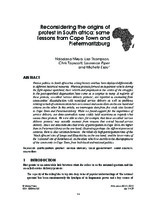Reconsidering the origins of protest in South Africa: some lessons from Cape Town and Pietermaritzburg

View/
Date
2011Author
Nleya, Ndodana
Tapscott, Chris
Thompson, Lisa
Piper, Laurence
Esau, Michelle
Metadata
Show full item recordAbstract
Protest politics in South Africa has a long history and has been deployed differentially
in different historical moments. Whereas protests formed an important vehicle during
the fight against apartheid, their rebirth and propulsion to the centre of the struggles
in the post-apartheid dispensation have come as a surprise to many. A majority of
these protests, so-called ‘service delivery protests’, are reported as emanating from
communities’ dissatisfaction with municipal service delivery as well as problems
relating to lack of communication between council and councillors on the one hand and
citizens on the other. In this article, we interrogate data from five study sites located
in Cape Town and Pietermaritzburg. While we found support for the importance of
service delivery, our data contradicts many widely held assertions as regards what
causes these protests. We were able to show, for example, that these so-called ‘service
delivery protests’ may actually emanate from reasons that extend beyond service
delivery. Since our data indicates that levels of participation in Cape Town are higher
than in Pietermaritzburg on the one hand, illustrating perhaps the different provincial
contexts, there is also variation between the relatively high participation rates of the
‘black African’ sites of Langa and Khayelitsha, on the one hand, and the lower rates of
the ‘coloured’ site of Bonteheuwel, on the other, which we ascribe to the disengagement
of the community in Cape Town, from both local and national politics.
